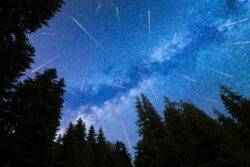The best time to watch the Perseids is after midnight (Picture: Shutterstock / Belish)
It’s that time of year again when the Perseid meteor shower is set to light up the night skies.
The annual shower occurs every year between July 17 and August 24 and is considered one of the highlights of the astronomical year for stargazers.
While it typically peaks in August, you can start watching for meteors as early as tonight.
The Perseids are caused by the Earth passing through the debris trail left behind by a comet called Swift-Tuttle.
This comet was last close to Earth in 1992 and will not return until 2125. However, the debris trail left behind by the comet is what causes the Perseid meteor shower every year.
The comet’s debris trail is made up of small pieces of ice and rock, and when the Earth passes through it, these pieces burn up in the atmosphere, creating a meteor shower.
The Perseids are known for being bright and fast-moving meteors. They can often be seen streaking across the sky at speeds of up to 60 miles per second. In a good year, you can see up to 100 Perseid meteors per hour.
The Perseids are caused by the Earth passing through the debris trail left behind by a comet called Swift-Tuttle (Picture: Unsplash)
This year will be a good one to watch the Perseid meteor shower as the moon will be a waning crescent, so it won’t be too bright to interfere with your viewing.
The best time to watch the Perseids is after midnight, when the radiant (the point in the sky from which the meteors appear to come) is high in the sky.
How to watch the Perseids from the UK
The Perseids are best seen in the early morning hours, so you’ll want to find a dark, open area away from city lights and watch the sky from about 11pm to 3am.
You might even be able to see some meteors in the early evening, but the number of meteors will increase as the night goes on.
The Perseids are one of the more reliable meteor showers so you should be able to see them even if you’re in a light-polluted area.
This year, the peak of the Perseid meteor shower will be on August 13, so you have plenty of time to perfect your meteor-spotting skills.
MORE : ‘Meteorite’ crashes through roof of family home in rare event
MORE : Don’t miss the Eta Aquariid meteor shower, which will peak tonight
Schedule some stargazing this month.





